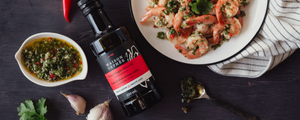When you shop for a quality oil, are you looking at the labels to find the words “first cold pressed” and “extra virgin”? If so, it's a very good habit, but unfortunately, it can also play tricks on you!
Extra positive
While today extra virgin olive oil is the pinnacle of olive oil quality, it has not always been part of Canadian culture. It took time for it to carve out a place for itself in consumers' lifestyles... and it didn't happen by itself! Recognition of the “extra” attribute is the result of great marketing efforts.
The great seduction of IOC
We owe the worldwide recognition of extra virgin olive oil to the International Olive Council (IOC). It is an intergovernmental organization that was established in 1959 to regulate the trade of olive oil and table olives.
The IOC has run several promotional campaigns to raise consumer awareness of the quality and health benefits of extra virgin olive oil. For example, in 1993, the IOC launched a promotional campaign in Europe to encourage consumers to use extra virgin olive oil in their daily diet. This was followed by similar campaigns elsewhere in the world.
In 2001, the IOC launched a promotional campaign in North America to promote the use of extra virgin olive oil in daily culinary practices. This was a great success and helped increase the demand for extra virgin olive oil in the North American market.
More recently, in 2010, the IOC and the World Health Organization released a joint report entitled “The Health Benefits of Extra Virgin Olive Oil”. This report highlights the health benefits of using extra virgin olive oil in the diet and its impact has been felt all the way to Quebec.
What do extra virgin mean?
For an oil to be classified as virgin, it must necessarily have been subjected to the cold extraction process, which does not lead to oil alteration, and must not have undergone any other treatment than grinding, kneading, centrifugation and filtration.
For its part, the term “extra” refers to the special characteristics sought in a quality olive oil: it must be devoid of defects (e.g. rancidity) and have certain positive attributes (peppery, bitter and fruity).
Except that there is a big problem!
Resources to ensure that olive oils marketed by producers and distributors meet the criteria of an extra virgin oil are sorely lacking. In other words, it is too easy to write on a bottle that an oil is “extra virgin”, even if the product inside does not meet the established criteria (without defects, peppery, bitter and fruity).
It’s even worse: the term “extra virgin” has been promoted so heavily by successive advertising campaigns that it has become desirable in the eyes of consumers, regardless of its implications.
Therefore, the term “extra virgin” is often misused by producers of various types of oils, including oils that are not produced from olives. For example, some seed oils, such as coconut oil or avocado oil, are sometimes labelled as “extra virgin”, even if this title is exclusive to olive oil.
Understanding the difference
When buying olive oil, be sure to read the label carefully to make sure you are buying an authentic extra virgin olive oil. We also suggest this detailed post to help you!
It is important to note that authentic extra virgin olive oils are normally more expensive than other types of oils. If the price seems too good to be true, it is likely that there is something else in the bottle than the “extra virgin” quality.
Finally, if a company labels its avocado oil as “extra virgin”, it is likely more concerned about maximizing its profits than being transparent with you!

